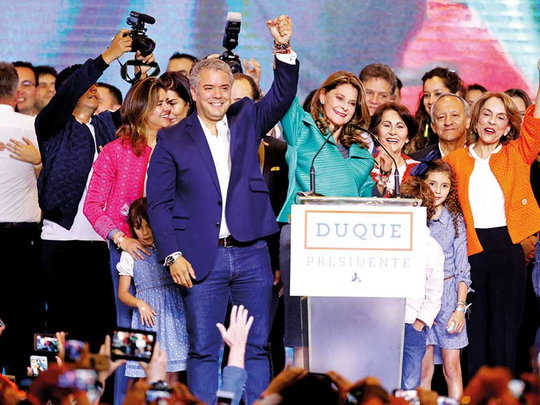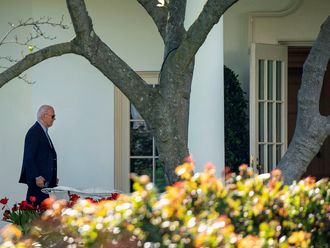
Bogota: Ivan Duque, a populist young conservative who tapped into dissatisfaction with the economy and a controversial peace deal with rebels, won Colombia’s presidential vote on Sunday.
Duque, a former senator from the right-wing Democratic Centre party, won about 54 per cent of the vote in the balloting on Sunday, the second and last round of elections, election officials said. He defeated Gustavo Petro, a former guerrilla member and one-time mayor of Bogota, the capital, who got about 42 per cent.
Duque’s showing capped a remarkable political rise. Buoyed by charm and a conservative upwelling in Colombia, he secured the presidency in an election where many who voted for him did not even know his name a year ago. At 41, he will be one of the youngest presidents in the country’s history.
Far better known is Duque’s longtime mentor, Alvaro Uribe, a firebrand ex-president who delivered pummeling blows against the country’s main rebel group and drug traffickers over his eight years in office, from 2002 to 2010.
Blocked by term limits from returning to the post, Uribe now holds a Senate seat from which he wields outsize power. He founded his own party; emerged as the chief antagonist to his successor, the departing president, Juan Manuel Santos; led the charge against a peace deal with the rebels — and chose Duque, as his preferred candidate.
Duque rebuffed suggestions that Uribe would govern through him were he to win. But it was clear Sunday that the close relationship between the men helped Duque get many of the votes that were cast.
“I don’t know why people say they fear Uribe,” Delia de Rojas, 75, a widow who receives a military pension, said after casting her vote for Duque. “He was the one that put order in the country,” she said. “Now with Duque, we will have that another time.”
The election was the first to be held since the end of Colombia’s war with its main rebel group, the Revolutionary Armed Forces of Colombia, known as the FARC.
For generations, the conflict was the Centre of presidential politics. Yet how the peace deal signed by Santos was to be put into effect was not often discussed in the campaign, and sometimes appeared to be an afterthought.
Instead, Colombia moved toward a new set of questions: How should the country tackle the corruption scandals that have hit it, along with other countries in the region? What should be done about the rising number of Venezuelan refugees who have poured in over the country’s borders? What is to be done about rising coca production?
But the war carries a long shadow, and the peace deal affected the fortunes of both men on the presidential ballot on Sunday.
Duque was aided by his party’s long opposition to the peace deal; it argued that the agreement was too lenient on drug traffickers. Many who voted the deal down after a referendum in 2016 gave their votes to Duque.
The end of the war with the FARC appeared to help Petro, too, as the first serious left-wing candidate for president in years. Some analysts said peace may have softened the stance of many Colombians against ex-rebels, allowing a former guerrilla to make headway.
The campaign may offer some hints as to how Duque will govern.
He published a book called “The Future Is at the Political Center” this year and backed off some of his party’s more right-wing stances. And while he has expressed doubts about the peace deal agreed to in 2016, he has not asked to overturn it. He has, though, suggested some modifications.
“It strikes me as odd that they box him in as someone with positions that are radical,” said Felipe Buitrago, a friend of Duque, who worked with him at the Inter-American Development Bank before he entered politics.
On combating drugs, his stances have appeared closer to his mentor, Uribe. Duque has supported a return to aerial spraying of coca crops. The Santos government had banned spraying over health concerns about the chemical used. Duque also is against considering the legalisation of some drugs, a growing trend among Latin American countries.
“He will return to the iron fist of coordination with the US,” said Arlene Tickner, a political scientist at Del Rosario University in Bogota.
Petro, for his part, ran a campaign in which he denounced the corruption of top politicians and said that for both economic and environmental reasons he would phase out coal and oil exports, saying the country relied too much on hydrocarbons.
As mayor of Bogota, he had success reducing prices for public transportation and gave subsidised water to the poor — but also was briefly impeached after a standoff with officials over city garbage collection.
Petro’s history as a fighter appealed to Jairo Montoya, 20, a hotel student in Bogota who was one of many young people who turned out to vote for him on Sunday. He said he saw the former guerrilla as a catalyst for structural changes in the country.
“It’s time to bring down those who have always been in power,” he said, referring to politicians like Duque and Uribe. “It’s time to have another kind of government.”
Such sentiments, however, may have been against the tide in a country which ranks among the region’s most conservative. Many of the biggest debates now Centre on the hot-button culture wars that have consumed politics in other countries.
“I am not for abortion, not for same-sex marriage — and Petro is,” said Carlota Jaimes, 42, an accountant. “I don’t think to protect women, young people and Christian values, it’s all right to be in favour of these things.”
Jaimes cast her vote for Duque, and headed out of the polling booth.












